Ninja Theory is a developer that doesn't have very much work under their belt, but the work that they have done has type-cast them into a very specific niche of games. They got their start with the PS3-exclusive Heavenly Sword, and then went on to develop the rebooted DMC (Devil May Cry). So they specialize in stylish, fast-paced, thumb-blistering action games. Hellblade: Senua's Sacrifice is a bit different though. It still has plenty of hacking and slashing, but it's a much slower, more cerebral experience, and it's Ninja Theory's first game that seems to really be about something.
Death, love, and psychosis
One of the principle gimmicks of the game is its perma-death feature. Early in the game, Senua is afflicted by a black rot on her arm. Each time she dies, the rot grows, and if it reaches her head, then she is lost to the abyss. At that point, the game is over, and your save file is deleted. It's similar to the concept of hollowing in Dark Souls, except this time, the game is very upfront and explicit in informing you that it can put a premature end to your adventure.
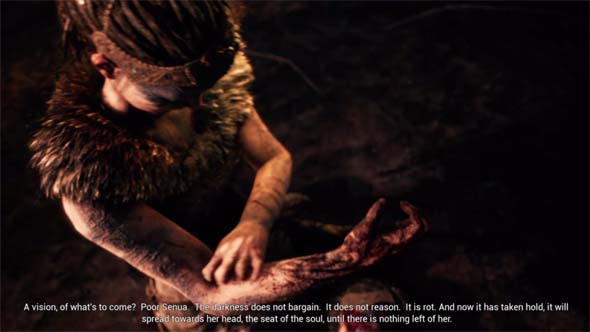
Out damned rot! Out, I say!
Each time you die, the rot grows. If it reaches your brain, it's game over, and your save file is deleted.
This upfront threat puts significant ludic pressure on the player to take Senua's life seriously and to play cautiously and defensively. Not only do you lose some small amount of progress when you die; you may lose all your progress if you are repeatedly sloppy. Ninja Theory isn't completely cruel though. As I progressed through the game, it became apparent that this mechanic is surprisingly forgiving. And if you want to know just how forgiving I think it is, then you can check out the super-duper-secret spoiler section at the bottom of this review. Early in the game, I started to suspect that the rot does not seem to progress if you die repeatedly to the same enemy or trap, so repeat deaths at the hands of a single particularly challenging encounter will not unfairly end your game. In fact, dying in boss encounters didn't seem to progress the rot at all! The combat difficulty is also set to automatically adjust itself by default. So if the waves of enemies become overwhelming for the player, the game will automatically scale them back.

PS Plus members can save scum
using the PS Cloud.
Also, if you happen to be playing on the PS4 (and are a PS Plus member), you can still save scum by using the PS Cloud feature. I would assume that you could also make a copy of your save file for the PC version. So you can use that for insurance if you want. Don't let the threat of perma-death stop you from playing this game.
The voices told me to
The second, and arguably more important, major gimmick of Hellblade is that the player character is a mentally and emotionally traumatized person who is suffering from severe psychosis. The most obvious manifestation is via voices in your head. The advice and information that these voices provide will even vary and will often conflict.
The game recommends that you play with headphones. I don't have a pair of wireless or USB headphones, so I couldn't try this. So I can't say whether this improves the game's audio experience. I can say that some of the dialogue is annoyingly quiet, so subtitles are highly recommended. Unfortunately, the subtitles are also frequently incorrect, and they often don't show up for the hallucinatory voices anyway.
The voices in Senua's head can act as tutorial guidance or as a tip for where to go or how to avoid danger...
In many cases, the voices in your head act as tutorial guidance by urging you to perform certain actions. Or they'll act as a sort of "danger sense" that warns you to watch your back when you're surrounded, or to try an alternate solution to a puzzle, or to guide you along the correct path. They don't give you on-screen button prompts, so you'll have to actually pause the game to look up the controls -- which is fine. Ninja Theory maybe could have put the controls on the loading screen or something in order to save the player some time, but it's not a big deal.
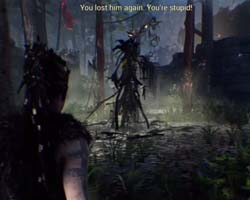
... or the Voices will berate Senua for perceived
failure or offer counter-productive advice.
At the same time, however, the voices will often give ... shall we say, "less helpful" advice. They'll sometimes tell you to turn back or to give up. They'll insist that your quest is a waste of time and that you're only walking into your own doom. The slightest setback will also cause the voices to berate you for perceived failure, or for being "stupid" or otherwise inadequate.
Unfortunately, it's always trivially easy to ignore such pessimistic advice or commentary because the game never presents the player with a situation in which these derogatory hallucinations actually provide an authentic choice for the player to make. Turning back or giving up on a task is never the correct or optimal course of action, nor is there ever any illusion that such is the case. The end result is that the voices were never able to instill any sense of doubt in my mind about what I was doing. I feel that this gameplay reality does a significant disservice to the mental illness being depicted because for real people with real psychosis, the darker impulses that they may be tempted to obey can seem perfectly valid and correct to them.
This is pretty much the only blemish that I noticed in the game's portrayal of mental illness. Senua isn't depicted as crazy, as one-dimensional, or as a caricature of mental illness. She's a nuanced, multi-dimensional character who has suffered tremendous abuse from the people close to her due to her condition, and who finds tremendous joy in her lover who sees her as a genuine, functional person rather than a curse manifest. That, in fact, seems to be the whole point in the game: that dismissing such individuals as "crazy" only makes the problem worse. With the proper support structures in place, they can be a perfectly functional member of society and can live a relatively happy life.
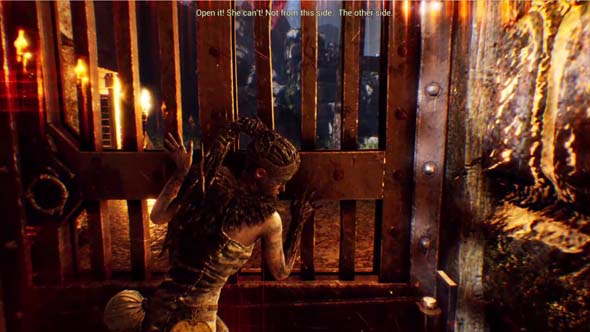
Senua can attempt to open doors that are actually physically locked or barred. But not the rune gates.
Senua's psychosis will also manifest in the form of the game's puzzles. You'll occasionally be stopped by a supposedly locked door. In order to open the door, you'll have to find a shape in the environment that matches a magical, glowing rune that appears on the door. I say "supposedly" because the game never really implies that there's anything stopping Senua from opening the door to begin with. She doesn't even try. Instead, she looks for patterns or shapes in otherwise mundane objects in the environment.
The behavior comes off as being more paranoid and obsessive than as being an actual solution to the problem. In fact, each boss that she battles will set up various trials for her to complete, but the rune-locked doors is never implied to be such a challenge. This suggests that having to stop at each door is a mental block on Senua's part, rather than an actual externally-imposed trial.
Senua's psychosis causes her to seek patterns where there probably aren't any.
Senua's mental illness does not need to define her
As for the rest of the gameplay: the combat mechanics are perfectly serviceable. If you can master the parry mechanic, then you're probably going to be able to get through most of the game without trouble, even on the hard setting. There's only a handful of enemy types, and each type only has a few different attack patterns that it uses.
I actually found the combat very cathartic in its simplicity. It's very up-close and personal, and very visceral and weighty. It does a good job of focusing you on a single point of attention (usually a single enemy), while also giving you some simple tools to keep you aware of your periphery. It's simple enough to not feel too taxing, but intense and precise enough that it remained challenging whenever more than one enemy was present at a time. Of course, your results may vary.
I also really liked the various set pieces, particularly the one where Senua is effectively made blind and has to listen to find her way around. Other set pieces are also pretty good, and they seem to get better as the game progresses.
There's very few genuine flaws with Hellblade: Senua's Sacrifice, and most flaws that are present can easily be waved away by appealing to the traumatized mental and emotional state of the player character. Making a game about mental disease is a bold move. Senua's Sacrifice isn't the first game to try it, but it's certainly one of the most interesting and successful. The overall tone of the story seems to be that Senua's disability does not have to be crippling, even though it very easily could be. With the proper support from friends, family, and lovers, a person with otherwise debilitating mental disorder can still lead a happy and productive life.
So just how forgiving is the perma-death mechanic?
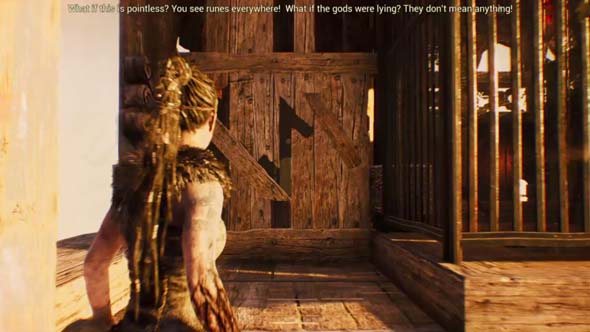
Senua suffers from tremendous self-doubt regarding her "ability" to see runes and patterns.
SHOW SPOILER HIDE SPOILER
Are you sure you want to read this?
Like, really, absolutely sure?
Learning this might completely change the way that you play the game in such a way that it will be far less impactful to you.
I highly recommend that you play the game first, then come back and read this.
But in summary: Don't let the threat of perma-death stop you from playing this game!
If you don't want to be spoiled, then close this section now.
Trust me, you'll be fine.
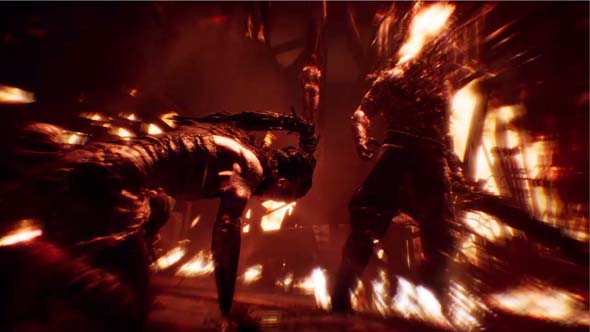
Dying is much more forgiving than the game makes it seem...
Why will you be fine?
Well...
... it's because ...
I think the game's threat of perma-death and save-file-deletion is an outright bluff.
After beating a particular boss, the rot suddenly expanded from Senua's elbow to her shoulder.
Later, the rot seemed to recede back to her elbow.
I actually went out of my way to try to get myself killed, and found that the rot wouldn't progress beyond Senua's elbow. Then, after reaching certain plot points without having died, the rot suddenly expanded up to her shoulder. Then, despite a death or two, it seemed to recede back down below the elbow. I think the progress of the rot is actually tied to your progress through the game, and the number of deaths you suffer in a particular area of the game only slightly modifies that.
Is the game broken? No. I actually think this bluff is genius. It's still very effective at providing the tension and fear that it would if the threat were real. By the time that you get to a point that you call the game on it's bluff on your own, then you should have already experienced the fear and tension that the threat is designed to invoke. The only way to avoid it would be to have the bluff spoiled by someone like me, which is why I tried very hard to keep you from accidentally reading the spoiler.
Also, once you start to become skeptical of the game's perma-death threat, you'll start to feel self-doubt about the game world and it's rules. This compliments the theme of mental illness quite fittingly. So I think the bluff is an all-around good move.
Of course, I'm not 100% sure that the threat is a bluff. You can feel free to test this out for yourself. Be sure to back up your save file to the cloud before you try it, though I doubt you'll actually need to. If you are able to get your save file deleted, then I'd be very curious to hear about it. Maybe even take a screenshot or post a video onto Youtube or Twitch and post a link in the comments. If you don't believe me when I say that the perma-death is a bluff, go ahead and try looking for other people's posted videos showing the the perma-death actually happen. If you find one, link to it in the comments.
I'll wait...
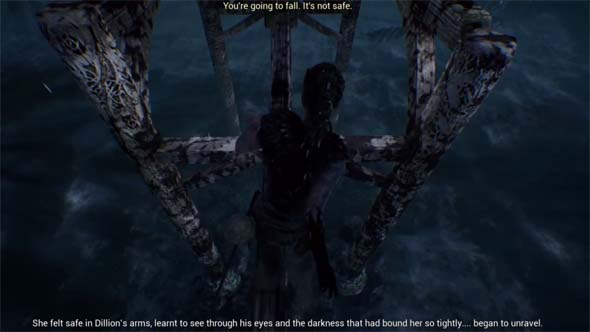
The perma-death bluff, along with the voices in your head, help to create doubt in the game world.